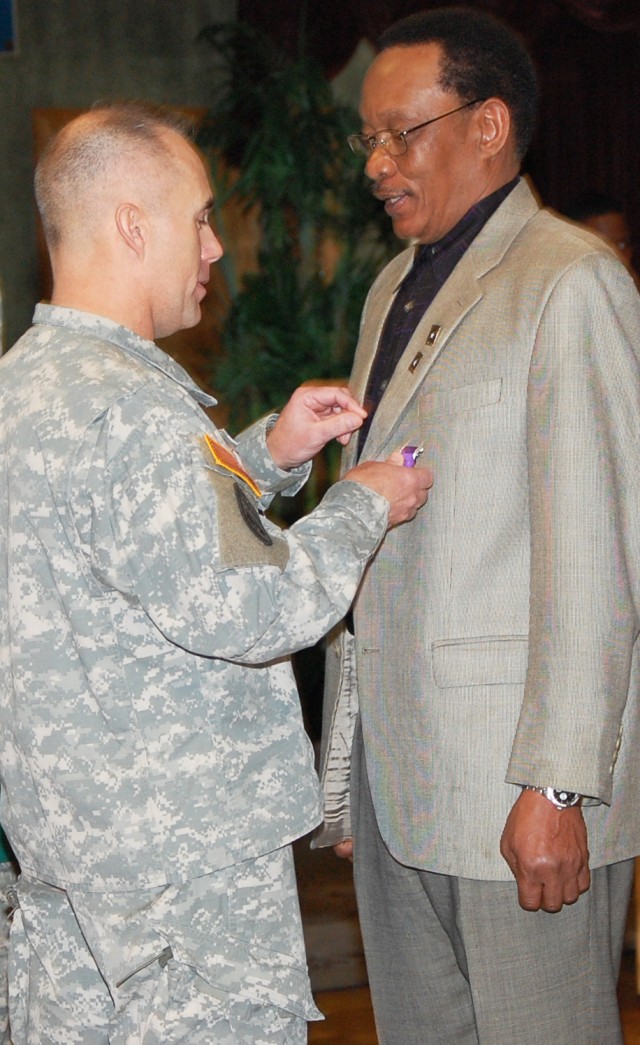
FORT LEE, Va. (Feb. 4, 2010) - After more than 40 years, a local Vietnam Veteran received a Purple Heart medal for injuries sustained in 1969 during the war.
Gus F. Danzey, an Army retiree, was awarded the medal during a noncommissioned officer induction ceremony held last month at Fort Lee.
Aca,!A"The process to award Danzey started with his wife, Sitrenia. She and his mother were looking through papers at his motherAca,!a,,cs home in Alabama and came across a document marked Aca,!A"telegram." She asked her husband if he had ever received any medals for being wounded in action. To her astonishment, he had not.
Aca,!A"I recall looking through some keepsakes and was inspired to do something,Aca,!A? Mrs. Danzey said. She collected the telegram that provided the evidence needed to process his Purple Heart. Her quest to get her husband the award that he rightfully earned began.
Talking about the war did not come easy for Danzey, and he never considered pursuing a medal. He was reluctant to give his wife his blessing to move forward because he did not want to relive the painful episodes of the war.
"I was wounded in the war only to be wounded again by America,Aca,!A? he said, "they rejected us, called us 'baby killers.'" This was the origin of his bitterness and long suffering.
After much persistence from his wife, he came to grips with the idea of her pursuing the medal. After contacting the records office and finding that there was no record of her husband being awarded the Purple Heart, she decided to research the possibility of it being initiated again.
Aca,!A"I contacted Virginia Sen. Jim WebbAca,!a,,cs office in April 2009 and provided a copy of the telegram,Aca,!A? Mrs. Danzey said. The senatorAca,!a,,cs office contacted the Department of the Army Human Resources Command who amended his DD 214 (document verifying military service) to reflect his entitlement.
The smile on Mrs. DanzeyAca,!a,,cs face seemed to bear evidence of the happiness that she talked about once they heard the award was approved. He recalled periods of silence infused with moments of joy.
Aca,!A"This has shown me that the Army will respond and stand willing to make corrections,Aca,!A? he said.
Aca,!A"Having a senator who is former military helped, too,Aca,!A? his wife added.
The physical wounds of war healed, but silenced in DanzeyAca,!a,,cs mind was a trail of bitterness that followed. He had to fight many of the mental battles of the war as the nightmare of Vietnam played in his mind over again.
The quiet veteran spoke with apprehension as though he was afraid of revisiting Vietnam and the haunting moment of his injury.
Etched in his memory is the story of Cam Ranh Bay and various battles. The painful memories of those lost in the war has long lived in corridors of his mind. In his struggle, he ceased to remember the laughter and tears of the good and bad times he experienced.
Aca,!A"I put Vietnam away in my mind and blocked out the memories,Aca,!A? he said. "I felt remorse for those who did not return and guilty for returning.Aca,!A? He kept quiet about the war but revisited Vietnam in his sleep.
Danzey was assigned to the 630th Military Police Company, 97th MP Battalion, 16th MP Group, 18th MP Brigade in December, 1968 at Phan Thiet. He was part of a small group of troops that were selected to join airborne rangers at a landing zone to prepare for the mission ahead.
Aca,!A"We had a mission to guard detainees at the prisoner of war collection point,Aca,!A? said Danzey, who was a private first class at the time. "We worked with military intelligence and assisted in guarding and interrogating detainees.Aca,!A?
He paused to catch his breath before he described the morning that he and his fellow comrades were attacked with mortars by Vietnam rebels. It began with muffling sounds of mortar fire which woke he and his comrades.
Aca,!A"We were sleeping in our living quarters when we were attacked,Aca,!A? he said. Aca,!A"Everything happened so quickly.Aca,!A?
There was a silent moment as tears filled DanzeyAca,!a,,cs eyes.
After recovering from his physical injuries, Danzey returned to the states and was disturbed by the way that America seemingly responded to him and his fellow service members. There were no marching bands, pageantry, or parades celebrating the homecoming of heroes.
Aca,!A"I had a hard time readjusting to life in the states and the things that were going on in our nation at the time,Aca,!A? Danzey said.
But his dedication to duty remained. In 1971 Danzey volunteered to return to Vietnam for another year as a part of a secret enforcement squad whose mission was to perform convoy operations.
After the war, his love for the Army never died, but his disenchantment with America prevailed.
The DanzeysAca,!a,,c young son became ill in 1990, and the family moved to the Ronald McDonald House in New Orleans. He recalls his experience there as life-changing.
Aca,!A"My stay there rekindled my love for America," Danzey said. "The people there were kind and showed compassion. They were very supportive.Aca,!A?
That same support and compassion led to Mrs. Danzey's decision to request the Purple Heart medal for her husband.
In addition, to the Purple Heart he was awarded the Vietnam Service Medal with silver and bronze stars; Republic of Vietnam Campaign Medal with 1960 device; and the Republic of Vietnam Gallantry Cross with palm device.
Aca,!A"Receiving the Purple Heart was indeed an honor and now a chapter in my life has finally been closed,Aca,!A? he said.

Social Sharing